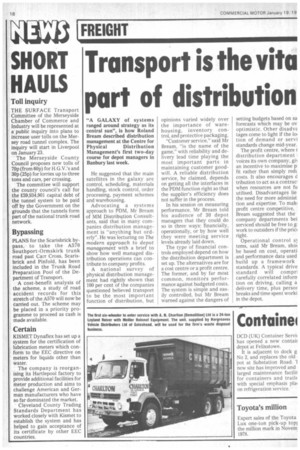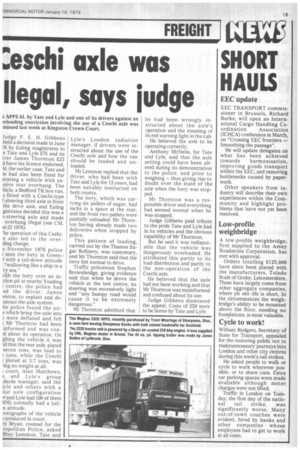SHORT Transport is the vita
Page 20

Page 21

If you've noticed an error in this article please click here to report it so we can fix it.
:eschi axle was port of distribution !legal, says judge
"A GALAXY of systems ranged around strategy as its central sun", is how Roland Bream described distribution management at the Centre for Physical Distribution Management's first two-day course for depot managers in Banbury last week.
He suggested that the main satellites in the galaxy are control, scheduling, materials handling, stock control, order processing, payment schemes and warehousing.
Advocating a systems approach to PDM, Mr Bream of MM Distribution Consultants, said that in many companies distribution management is "anything but orderly". He was lecturing on The modern approach to depot management with a brief to show how well managed distribution operations can contribute to company profits.
A national survey of physical distribution management had rightly shown that 100 per cent of the companies questioned believed transport to be the most important function of distribution, but opinions varied widely over the importance of ware housing, inventory control, and protective packaging.
"Customer service," said Mr Bream, "is the name of the game," with reliability and delivery lead time playing the most important parts in maintaining customer goodwill. A reliable distribution service, he claimed, depends on getting all the interfaces in the PDM function right so that the supplier's efficiency does not suffer in the process.
In his session on measuring performance, Mr Bream told his audience of 30 depot managers that they could, do so in three ways: financially, operationally, or by how well they were meeting service levels already laid down.
The type of financial controls employed depend on how the distribution department is set up. The alternatives are for a cost centre or a profit centre. The former, and by far most common, monitors performance against budgeted costs. The system is simple and easily controlled, but Mr Bream warned against the dangers of setting budgets based on sa forecasts which may be ov optimistic. Other disadva tages come to light if the lol tion of demand or servi standards change mid-year.
The profit centre, where t distribution department i voices its own company, gh an incentive to .maximise p1 fit rather than simply redt costs. It also encourages d tribution to act as a contraci when resources are not fu utilised. Disadvantages lie the need for more administ tion and expertise. To malo profit centre competitive, Bream suggested that the company departments bei serviced should be free to gi work to outsiders if the prict right.
Operational control s3, tems, said Mr Bream, shot be based on cost, operati . and performance data used build up a framework standards. A typical drive standard will compri carefully correlated inforn tion on driving, calling a delivery time, plus persor breaks and time spent worki in the depot. Judge F. E. H. Gibbens held a decision made in June 78 by Ealing magistrates to e Tate and Lyle £75 and its iver James Thornton £25 d have his licence endorsed. isit the earlier case, Tate and le had also been fined for erating a vehicle with ex;sive rear overhang. The hide, a Bedford TK box van, s fitted with a Ceschi-type 1-steering third axle in front the drive axle, and Ealing gistrates decided this was a a-steering axle and made overhang illegal (see CM, e23 1978).
'he operation of this Ceshi e also led to the overding charge.
n November 1976 police I seen the lorry in Green— I with a tail-down attitude "wallowing like a ship in a vy sea."
Vith the lorry over an in:lion pit at nearby Yeading centre, the police had ed the driver, James Irnton, to explain and deastrate the axle system.
he police found the air s which bring the axle into / were deflated and felt t Mr Thornton had been informed and was con9:1 about its operation. On ghing the vehicle it was Id that the rear axle, plated seven tons, was load to tons, while the Ceschi plated at 3.7 tons, was ing no weight at all.
court, Alan Matthews, a and Lyle's group .dards manager, said the icle and others with a [tar axle configuration e and Lyle had 100 of them 976) normally had a tailn attitude, aotographs of the vehicle produced in court.
ax Bryan, counsel for the ropolitan Police, asked ffrey Lemmon. Tate and Lyle's London radiation manager, if drivers were instructed about the use of the Ceschi axle and how the van should be loaded and unloaded.
Mr Lemmon replied that the driver, who had been with Tate and Lyle for 12 years, had been suitably instructed on both counts.
The lorry, which was carrying six pallets of sugar, had sacks in a space at the rear, and the front two pallets were partially unloaded. Mr Thornton having already made two deliveries when stopped by police.
This pattern of loading, carried out by the Thames Sugar Refinery, was customary, and Mr Thornton said that the lorry felt normal to drive.
Traffic policeman Stephen Brownbridge, giving evidence said that when he drove the vehicle at the test centre, its steering was excessively light and "any bumpy road would cause it to be extremely dangerous."
Mr Thornton admitted that he had been wrongly instructed about the axle's operation and the meaning of its red warning light in the cab.
He believed the axle to be operating correctly.
Anthony McNeile, for Tate .and Lyle, said that the axle setting could have been altered during its demonstration to the police, and prior to weighing — thus giving rise to doubt over the state of the axle when the lorry was stopped.
Mr Thornton was a responsible driver and everything had seemed normal when he was stopped.
Judge Gibbens paid tribute to the pride Tate and Lyle had in its vehicles and the obvious capability of Mr Thornton.
But he said it was indisputable that the vehicle was dangerously overloaded. He attributed this partly to its load distribution and partly to the non-operation of the Ceschi axle.
He believed that the axle had not been working and that Mr Thornton was misinformed and confused about its use.
Judge Gibbens dismissed the appeal. Costs of £50 were . to be borne by Tate and Lyle.




































































































